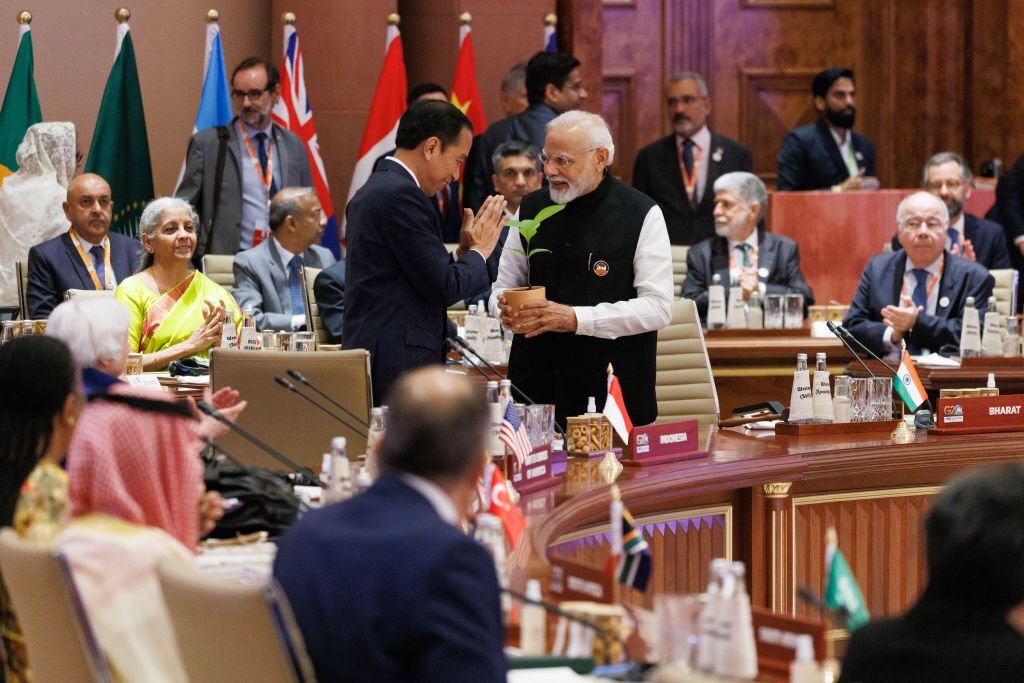The G20: Shaping Global Policies for a Sustainable Future
The G20, or Group of Twenty, is a prominent intergovernmental forum consisting of 19 sovereign countries and the European Union. Established in 1999 as a response to the Asian financial crisis of the late 1990s, the G20 represents a collective force that wields substantial economic influence. It comprises the world’s largest economies, which jointly contribute to approximately 85% of global GDP, and 75% of international trade, and encompass two-thirds of the global population. This article delves into the G20’s purpose, its member nations, and its pivotal role in addressing global challenges.
Understanding the G20
The G20 is fundamentally a platform for international cooperation and policy coordination. While its primary focus revolves around economic matters, such as fiscal and monetary policies, it also encompasses a broader agenda that encompasses crucial global issues. These encompass climate change mitigation, sustainable development, and international security.
Origins of the G20
The origins of the G20 can be traced back to the G7, or Group of Seven, an influential forum comprising the United States, Canada, France, Germany, Italy, Japan, and the United Kingdom. In recognition of the changing global economic landscape, the G7 leaders decided to establish the G20 to incorporate emerging economies into the international economic discourse. This expansion aimed to provide a more comprehensive perspective on global economic challenges and foster inclusive solutions.
Member Countries of the G20

The G20’s member countries represent diverse economic backgrounds, each contributing its unique strengths and challenges to the global stage.
Let’s take a closer look at these nations:
Argentina: Known for its agricultural production and export industry, Argentina also boasts a thriving tourism sector.
Australia: Australia is a key exporter of minerals, energy resources, and agricultural products, and it is renowned as a popular tourist destination.
Brazil: Brazil is a significant player in the global agricultural and manufacturing sectors.
Canada: Canada is renowned for its export of natural resources, including oil, gas, and timber, alongside its robust financial sector.
China: As the world’s second-largest economy, China holds a prominent position in manufacturing and exports.
France: France ranks as the world’s sixth-largest economy and is notable for exporting luxury goods, agricultural products, and machinery.
Germany: Germany ranks as the world’s fourth-largest economy, primarily exporting machinery, vehicles, and chemicals.
India: India stands as the world’s fifth-largest economy, exporting IT services, agricultural products, and pharmaceuticals.
Indonesia: Indonesia ranks as the world’s seventh-largest economy, known for its export of natural resources such as oil, gas, and coal.
Italy: Italy is the world’s eighth-largest economy, celebrated for its machinery, luxury goods, and food product exports.
Japan: Japan ranks as the world’s third-largest economy, with major exports in vehicles, electronics, and machinery.
Mexico: Mexico holds the position of the world’s fifteenth-largest economy, excelling in exports of manufactured goods like automobiles, electronics, and textiles.
Republic of Korea: The Republic of Korea ranks as the world’s eleventh-largest economy and is distinguished for its electronics, vehicles, and ship exports.
Russia: Russia holds the position of the world’s tenth-largest economy, primarily exporting oil, gas, and minerals.
Saudi Arabia: Saudi Arabia, the world’s eighteenth-largest economy, stands out as a major exporter of oil and gas.
South Africa: South Africa is the world’s twenty-ninth-largest economy and is known for exporting minerals such as gold, platinum, and diamonds.
Turkey: Turkey, the world’s seventeenth-largest economy, excels in textile, vehicle, and machinery exports.
United Kingdom: The United Kingdom is the world’s fifth-largest economy, prominently exporting financial services, manufactured goods, and creative products.
United States: As the world’s largest economy, the United States is a significant exporter of agricultural products, manufactured goods, and services.
European Union (EU): The European Union, a political and economic union of 27 member states, is the world’s largest single market and ranks as the world’s second-largest economy.
Significance of the G20
The G20’s significance is profound, given its role in addressing global economic challenges. It has the power to shape policies that influence the world economy, directly impacting people worldwide.
Here are a few reasons why the G20 is pivotal:
Global Economic Stability and Growth: The G20 is dedicated to collaborating on global economic stability and growth. This involves coordinating economic policies and tackling international economic risks.
Challenges of Globalization: Acknowledging the multifaceted nature of globalization, the G20 aims to address both its challenges, such as inequality and financial instability, and its advantages.
Also Read: Hunter Biden And His Business Ventures: A Closer Look
Development of Global Economic and Financial Policies: By working together, the G20 creates global economic and financial policies that stimulate stability, growth, and prosperity, including the establishment of international standards and regulatory frameworks.
Promotion of International Trade and Investment: The G20 fosters international trade and investment by reducing trade barriers and creating a favorable investment environment.
Strengthening International Financial Cooperation: The G20 enhances international financial cooperation, strengthening the global financial system and averting future financial crises.
Promotion of Sustainable Development: The G20 promotes sustainable development through climate change mitigation, poverty reduction, and inclusive growth initiatives.
Achievements of the G20
Over the years, the G20 has achieved significant milestones, making a tangible impact on the global stage. Some of these accomplishments include:
Global Financial Crisis Response: The G20 played a crucial role in coordinating a global response to the 2008 financial crisis, effectively preventing a more severe recession and facilitating economic recovery.
Financial Reform and Regulation: In the aftermath of the 2008 financial crisis, the G20 initiated comprehensive financial reforms, including increased capital requirements for banks and enhanced financial system oversight, bolstering global financial stability.
Advancement of the Global Trade Agenda: The G20 has actively promoted trade liberalization and reduced trade barriers, contributing to increased global trade flows and economic growth.
Climate Change Mitigation: The G20 has been instrumental in addressing climate change, with member countries committing to reducing greenhouse gas emissions and encouraging investment in renewable energy sources.
Sustainable Development: The G20 has committed to promoting sustainable development by addressing food security, environmental protection, and poverty alleviation.
Challenges Facing the G20

Despite its successes, the G20 faces several significant challenges:
Global Economic Recovery: The global economy is still reeling from the effects of the COVID-19 pandemic. The G20 must work collaboratively to ensure an inclusive and sustainable recovery.
Climate Change: The pressing issue of climate change requires united efforts to reduce greenhouse gas emissions and adapt to its consequences.
Trade Tensions: Ongoing trade tensions between the United States and China pose a significant concern. The G20’s role in resolving these tensions and promoting equitable trade is paramount.
Inequality: Rising inequality in many nations demands collective action to create a more inclusive global economy.
Geopolitical Tensions: Geopolitical conflicts, like the war in Ukraine, challenge the G20’s ability to reach consensus on important matters.
G20 Summit 2023
The G20 Summit in 2023, hosted in New Delhi, India, on September 9-10, marks a significant event. The chosen theme, “One Earth, One Family, One Future,” underscores India’s commitment to collaborating with other nations to address pressing global issues and promote sustainable development.
Key Issues to Focused in the G20 Summit 2023
The global economic recovery from the COVID-19 pandemic: The COVID-19 pandemic has had a devastating impact on the global economy. The G20 Summit 2023 will focus on discussing and coordinating policies to promote economic recovery.
Climate change and sustainable development: Climate change is one of the biggest challenges facing the world today. The G20 Summit 2023 will focus on discussing and coordinating policies to reduce greenhouse gas emissions and to promote sustainable development.
Trade and investment: Trade and investment are essential for global economic growth. The G20 Summit 2023 will focus on discussing and coordinating policies to promote free and fair trade and to attract investment.
Digital transformation: Digital transformation is rapidly changing the world. The G20 Summit 2023 will focus on discussing and coordinating policies to promote digital transformation and to ensure that everyone benefits from it.
Global health: Global health is essential for global prosperity. The G20 Summit 2023 will focus on discussing and coordinating policies to improve global health and prevent future pandemics.
Food security: Food security is essential for global stability. The G20 Summit 2023 will focus on discussing and coordinating policies to promote food security and to address the challenges of hunger and malnutrition.
Energy security: Energy security is essential for global economic growth. The G20 Summit 2023 will focus on discussing and coordinating policies to promote energy security and to transition to a clean energy future.
Conclusion
The G20 is a vital international forum that addresses global economic challenges and offers opportunities for collaboration on broader global issues. Its diverse membership, influential policies, and numerous achievements make it a significant player on the world stage. However, as the world faces mounting challenges such as the ongoing pandemic, climate change, and trade tensions, the G20 must continue to adapt and lead the way towards a more equitable, sustainable, and prosperous global future.












[…] The G20 is a vital international forum that addresses global economic challenges and offers opportunities for collaboration on broader global issues. […]
November 2, 2023 at 9:19 amex sit voluptatem aliquam laudantium iure dicta sed voluptas ipsam eligendi ullam corrupti ipsa repellat impedit asperiores ut sed voluptatem cum inventore architecto. facilis eligendi tempora distinctio est quibusdam.
March 27, 2024 at 12:12 amconsectetur et ex molestiae error officia beatae ut consequatur et eveniet voluptatem tenetur. sit assumenda illo fugit eum voluptatem est. non quia reprehenderit sunt beatae alias rem et adipisci qui officiis nesciunt.
March 30, 2024 at 6:32 amanimi possimus dolorum tenetur omnis incidunt et corrupti ut dicta sit. cupiditate et tempora exercitationem earum omnis minima quod.
May 10, 2024 at 7:15 am